8 Best Hamburger Buns on Grocery Shelves, According to a Dietitian

There's no shortage of foods to sandwich into a hamburger bun for a delicious handheld meal. Beef, turkey, pulled pork, chicken breasts, and veggie or black bean burgers get an upgrade with a delicious, and sometimes more nutritious, hamburger bun to hold them.
Unfortunately, many hamburger buns on the market pack plenty of carbohydrates, sodium, and added sugars without adding many beneficial nutrients to your diet. Savvy shoppers can make their buns work for them healthwise and still get delicious-tasting buns if they pay attention to a few key factors. By skipping the traditional refined grain hamburger buns and choosing whole grain options or those with added fiber, protein, vitamins, and minerals, you can increase the staying power of your meal and get closer to your daily fiber and protein goals.
You could swap your burger bun for an alternative like a lettuce wrap, but sometimes you want and need those extra carbs and energy. We reviewed the best hamburger buns on grocery store shelves that offer the most nutritional benefits while satisfying your craving for a hearty and delicious bun. And while many others could have made the list, we also included two burger buns you may want to avoid for your health.
How we chose the best hamburger buns
While it's impossible to choose which hamburger bun will be healthiest for you and your specific nutrition goals, these are the nutrition factors we looked at to select the overall healthiest hamburger buns:
- Whole grains. Choosing hamburger buns that include whole grains instead of refined and enriched products can help decrease your risk of chronic diseases like heart disease, type 2 diabetes, and some forms of cancer. Over 90% of all bread products sold in the U.S. include refined grains, but our healthiest picks include whole grains, which will help you get to the Dietary Guidelines for Americans' recommendations of consuming at least 50% of your grains as whole grains.
- At least 3 grams of fiber. Whole grains naturally increase the fiber in hamburger buns, but consciously choosing ones with at least 3 grams of fiber per serving can help you reach your goals. The U.S. Dietary Guidelines recommend at least 14 grams of fiber for every 1,000 calories eaten, but only an estimated 5% of the population meets this recommendation.
- Be mindful of sodium. Processed bread products are notoriously high in sodium, even though they may not taste "salty." The Dietary Guidelines for Americans recommend no more than 2,300 milligrams of sodium per day, while most Americans get more than 3,400 milligrams on average. While low-sodium hamburger buns are hard to come by, most of our choices have 12% of the daily value of sodium or less per serving.
Read on to learn about the best and worst hamburger buns at the grocery store, then check out 7 Highest-Quality Frozen Burgers—and 2 to Avoid.
8 Best Hamburger Buns
Best: Nature's Own 100% Whole Wheat Hamburger Buns
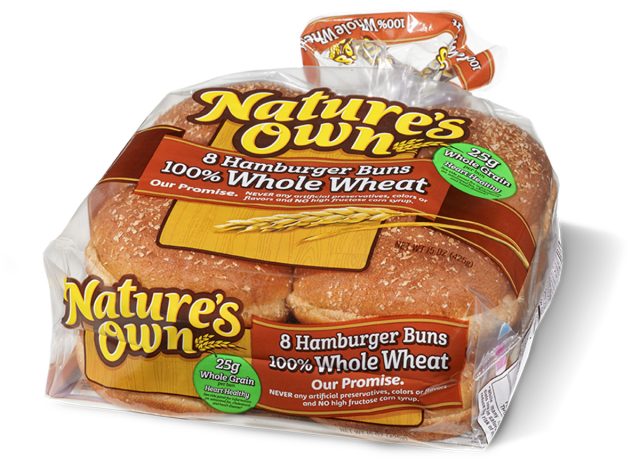
Calories: 130
Fat: 2 g (Saturated fat: 0 g)
Sodium: 200 mg
Carbs: 25 g (Fiber: 4 g, Sugar: 3 g)
Protein: 6 g
For an easy-to-find bun, Nature's Own 100% Whole Wheat Hamburger Buns feature 4 grams of fiber, or 14% of the daily value. There are no artificial colors or preservatives, and the bun contributes 6 grams of protein, which can help you reach your protein goals, especially if you're enjoying a veggie burger or other lower-protein option between the buns.
Best: Ezekiel 4:9 Sprouted Whole Grain Burger Buns
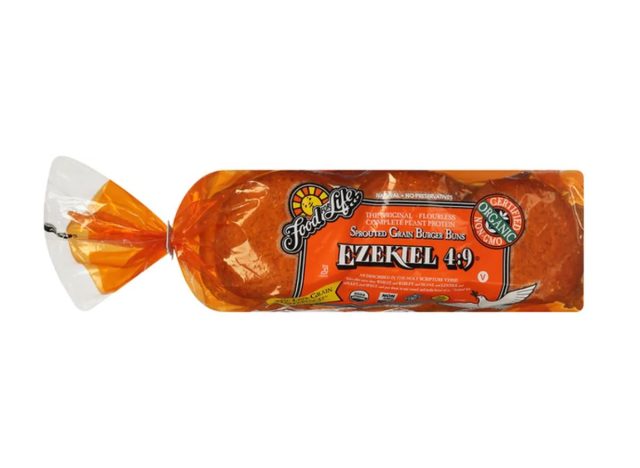
Calories: 90
Fat: 0.5 g (Saturated fat: 0 g)
Sodium: 80 mg
Carbs: 17 g (Fiber: 3 g, Sugar: 1 g)
Protein: 5 g
Ezekiel 4:9 Sprouted Whole Grain Burger Buns are made with organic barley, lentils, millet, soybeans, spelt, and wheat, which has been sprouted. Sprouting grains increases the ability to absorb valuable minerals like iron, zinc, and magnesium, and it increases protein and starch digestibility, making them easier on the digestive system. While the nutrition information on the back of the package is for only half of a bun, eating an entire bun with your burger will add 10 grams of protein, 6 grams of fiber, and 180 calories with no added sugars. This high fiber and high protein bun is 100% vegan and certified free from glyphosate and GMOs as well.
Best: Aunt Millie's Whole Grain Hamburger Buns
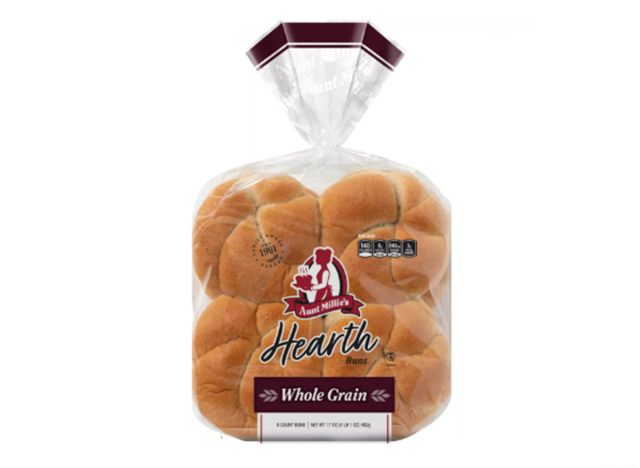
Calories: 140
Fat: 2 g (Saturated fat: 0 g)
Sodium: 240 mg
Carbs: 27 g (Fiber: 3 g, Sugar: 3 g)
Protein: 5 g
The first ingredient in Aunt Millie's Whole Grain Hamburger Buns is whole grains. It also includes enriched grains, making the bun a little less hearty while contributing 3 grams of fiber per serving. This is a good option if you don't enjoy the flavor or texture of whole grains or are transitioning from refined options to more fiber-filled choices. As an enriched product, it's a good source of B vitamins, which are added to the grains.
Best: Hero Classic Burger Buns
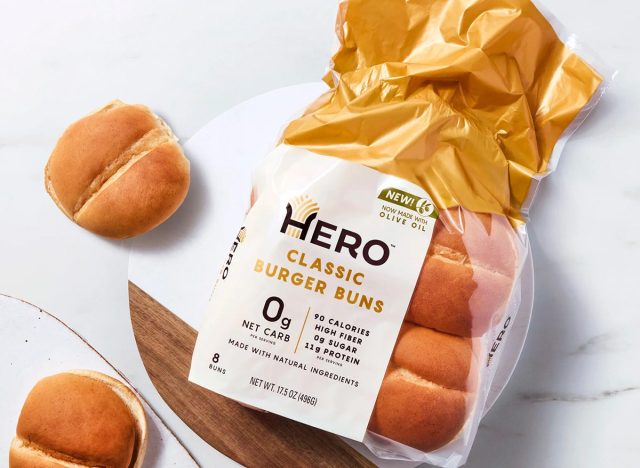
Calories: 90
Fat: 4 g (Saturated fat: 0.5 g)
Sodium: 390 mg
Carbs: 23g (Fiber: 22g, Sugar: 0g)
Protein: 11g
Hero Classic Burger Buns have more sodium than we'd like to see in a hamburger bun, with 17% of the recommended daily limit. Despite the high sodium content, they still make our list of healthiest hamburger buns because of the impressive 22 grams of fiber and 11 grams of protein. Using whole food ingredients like resistant starch, wheat protein, fava bean protein, and milled flaxseed, Hero buns can reach incredible amounts of protein and fiber, helping you quickly and easily reach your goals while maintaining the bread consistency you want in a bun.
Best: Rudi's Wheat Hamburger Buns
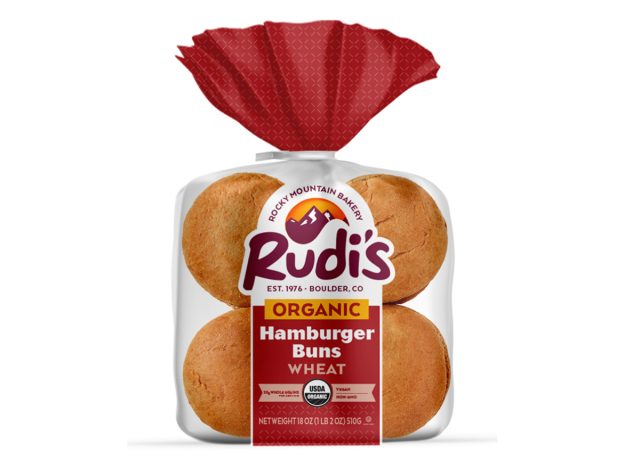
Calories: 160
Fat: 3 g (Saturated fat: 0 g)
Sodium: 240 mg
Carbs: 31 g (Fiber: 3 g, Sugar: 4 g)
Protein: 5 g
A high-fiber option with minimal ingredients, Rudi's Wheat Hamburger Buns are 100% USDA-certified organic. These buns use basic ingredients like whole wheat, potato flour, cornmeal, sunflower oil, and bran. Each serving has 5 grams of protein, 3 grams of fiber, and just 10% of the recommended daily limit for sodium.
Best: Schmidt Old Tyme 647 Sandwich Rolls
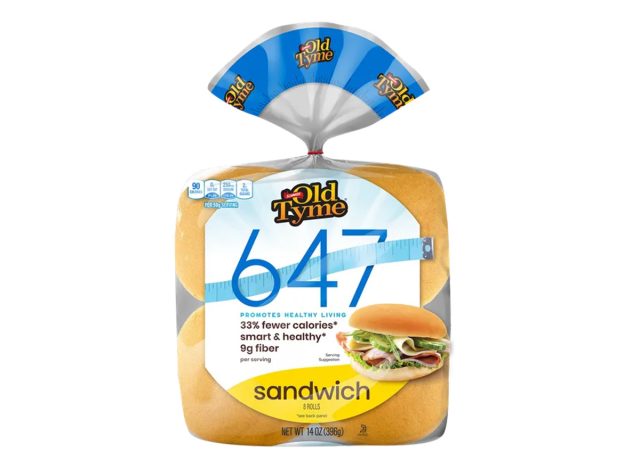
Calories: 90
Fat: 1 g (Saturated fat: 0 g)
Sodium: 250 mg
Carbs: 24 g (Fiber: 9 g, Sugar: 2 g)
Protein: 5 g
For a low-calorie burger bun packed with fiber and protein with only 90 calories per serving, try Schmidt Old Tyme 647 Sandwich Rolls. Made with enriched wheat and oat fiber, each bun has 9 grams of fiber, or 32% of the daily value, and includes extra B vitamins like thiamin and folate and 6% of the daily value of iron.
Best: Alvarado St. Bakery Sprouted Wheat Burger Buns
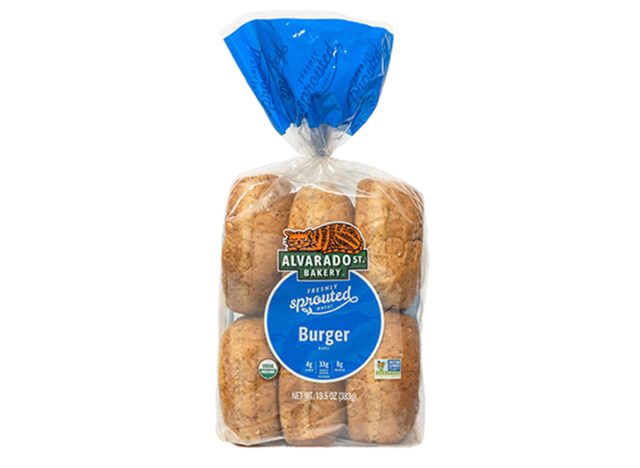
Calories: 160
Fat: 1 g (Saturated fat: 0 g)
Sodium: 250 mg
Carbs: 30 g (Fiber: 4 g, Sugar: 3 g)
Protein: 8 g
Primarily made with organic sprouted whole wheat berries, Alvarado St. Bakery Sprouted Wheat Burger Buns have 8 grams of protein and 4 grams of fiber. Sprouting grains increase the ability to absorb and utilize the nutrients found in them and also increase the digestibility of the grains. In addition to offering more protein and fiber than most hamburger buns, this particular variety is also USDA organic. It includes just 3 grams of added sugars with the addition of organic agave syrup.
Best: Carbonaut Hamburger Buns
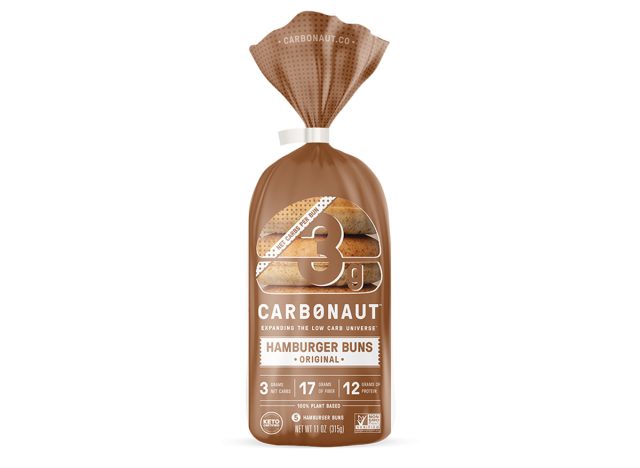
Calories: 150
Fat: 5 g (Saturated fat: 0 g)
Sodium: 240 mg
Carbs: 20 g (Fiber: 17 g, Sugar: 0 g)
Protein: 12 g
Another low-net carb hamburger bun, Carbonaut Hamburger Buns, has an impressive 17 grams of fiber and no added sugars for only 3 grams of net carbs. Each serving also includes 12 grams of protein to help you feel full and satisfied with your meal. With a short list, you'll find ingredients like wheat protein, resistant starch, flax meal, inulin, pea fiber, and psyllium. These types of fiber are important for feeding gut bacteria for a healthy and diverse gut microbiome.
2 Hamburger Buns To Avoid
Worst: King's Hawaiian Pretzel Hamburger Buns
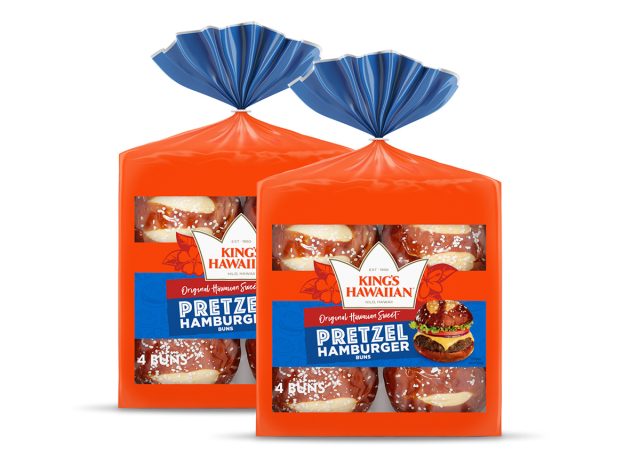
Calories: 220
Fat: 6 g (Saturated fat: 2.5 g)
Sodium: 760 mg
Carbs: 34 g (Fiber: <1 g, Sugar: 12 g)
Protein: 7 g
King's Hawaiian Pretzel Hamburger Buns are a trifecta of hamburger bun blunders. With too much sodium, added sugars, and less than 1 gram of fiber, these buns are better left on the shelf. Just one pretzel bun has 33% of the daily value for sodium and contributes 11 grams of added sugars. While each bun has 34 grams of carbohydrates, not even 1 whole gram comes from fiber. You'll also find an abundance of preservatives in the long list of ingredients, which help contribute to the high sodium content.
Worst: Oroweat Golden Seeded Buns
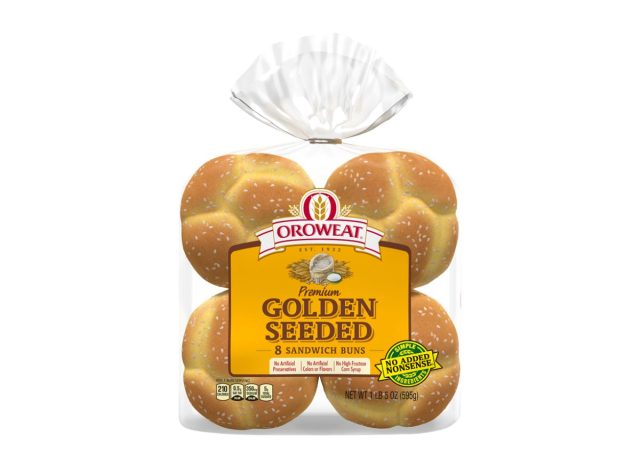
Calories: 210
Fat: 4 g (Saturated fat: 0.5 g)
Sodium: 350 mg
Carbs: 37 g (Fiber: 1 g, Sugar: 5 g)
Protein: 7 g
With only 1 gram of fiber but 37 grams of carbohydrates, Oroweat Golden Seeded Buns are made of refined grains and offer little to help you meet your daily fiber goals. In addition, each bun has 350 milligrams of sodium, getting you 15% of the way to your sodium limit with just one bun.
- Source: Dunford, E. K., Miles, D. R., Popkin, B., & Ng, S. W. (2022). Whole Grain and Refined Grains: An Examination of US Household Grocery Store Purchases. The Journal of nutrition, 152(2), 550–558. https://doi.org/10.1093/jn/nxab382
- Source: https://www.ncbi.nlm.nih.gov/pmc/articles/PMC6124841/
- Source: Yoon, H., Cai, Q., Yang, J. J., Lipworth, L., Cai, H., Yu, D., Steinwandel, M. D., Gupta, D. K., Blot, W. J., Zheng, W., & Shu, X. (2024). Sodium intake and Cause-Specific mortality among predominantly Low-Income Black and White US residents. JAMA Network Open, 7(3), e243802. https://doi.org/10.1001/jamanetworkopen.2024.3802
- Source: Ikram, A., Saeed, F., Afzaal, M., Imran, A., Niaz, B., Tufail, T., Hussain, M., & Anjum, F. M. (2021). Nutritional and end-use perspectives of sprouted grains: A comprehensive review. Food science & nutrition, 9(8), 4617–4628. https://doi.org/10.1002/fsn3.2408
- Source: Riva, A., Rasoulimehrabani, H., Cruz-Rubio, J. M., Schnorr, S. L., Von Baeckmann, C., Inan, D., Nikolov, G., Herbold, C. W., Hausmann, B., Pjevac, P., Schintlmeister, A., Spittler, A., Palatinszky, M., Kadunic, A., Hieger, N., Del Favero, G., Von Bergen, M., Jehmlich, N., Watzka, M., . . . Berry, D. (2023). Identification of inulin-responsive bacteria in the gut microbiota via multi-modal activity-based sorting. Nature Communications, 14(1). https://doi.org/10.1038/s41467-023-43448-z







